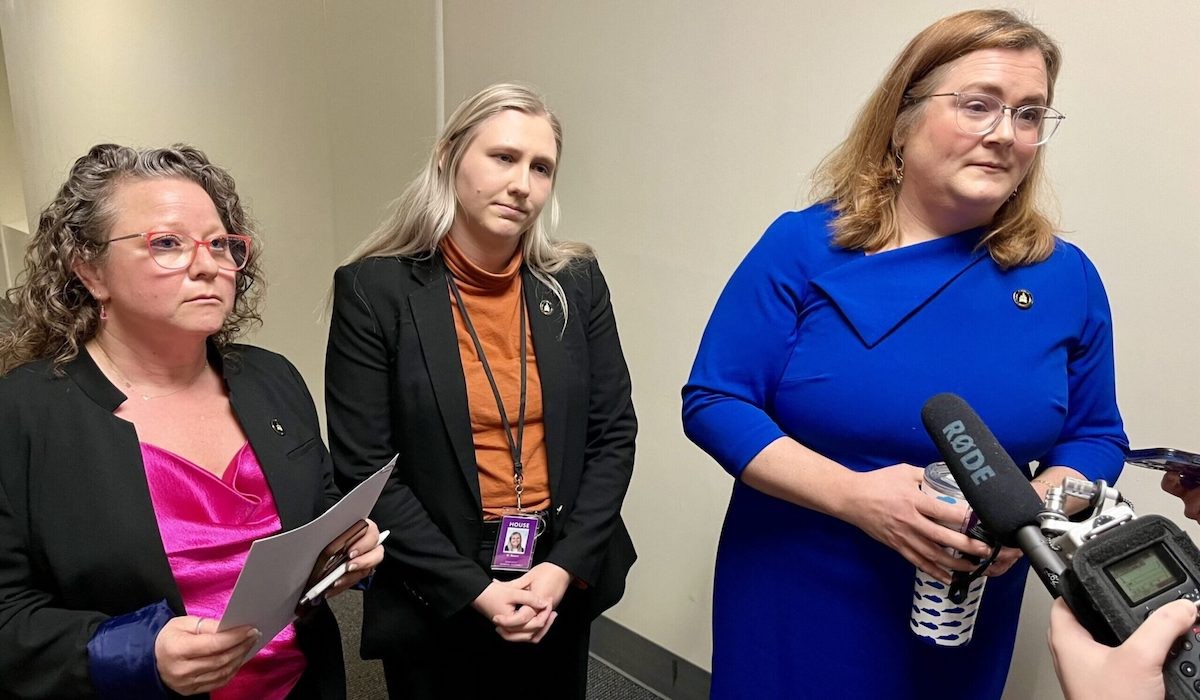In 2017, Central Kentuckian Heather Hyden faced an “upsetting, awful” and “horrific experience.” The baby she carried — a “very wanted pregnancy” — had a lethal fetal anomaly.
She was induced in February of that year, medical care she would be unable to receive in Kentucky today because of the state’s near-total ban on abortion.
In written testimony, Hyden raised concerns about a bill that passed unanimously out of the House Health Services Committee Thursday, saying it would further limit options for Kentuckians like her whose pregnancies are not straightforward.
Three Democratic lawmakers did not vote after they walked out to protest the measure, which one of them said “masquerades as help” but really “shames mothers who are losing children.”
House Bill 467, sponsored by Rep. Nancy Tate, would require health insurers to cover perinatal palliative care for people with nonviable pregnancies or whose babies are expected to die near birth. The bill also requires providers to refer patients in those circumstances to perinatal palliative care and mandates a list of services the programs shall provide including “assistance with the creation of memories and keepsakes.”The bill says that one of its rationales is to provide “supports as alternatives to pregnancy termination,” essentially incentivizing Kentuckians against abortion, which is outlawed in most cases in the state.
The bill outlines care parents should receive “through the remainder of a pregnancy, the birth, the newborn period, and the death.”
“Because I gave birth to my daughter (River Lee), I was able to hold her and take a lot of photos with her and learn more about her terminal diagnosis and have her cremated,” Hyden said in written testimony provided to lawmakers. Hyden was in her 16th week of pregnancy. River Lee passed during labor.
“All of this was outstanding palliative care following my birth plan,” Hyden said. “Today, I would have to travel outside of the state to receive care like this because of our current statutes related to abortion. Because of this, I would also not receive the much-needed care that HB 497 is offering.”
Tate, R-Brandenburg, a staunch opponent of abortion, said she sees her bill as compassionate and calls it the Love Them Both Part II Act.
“I think this is a very compassionate piece of legislation that gives us the opportunity to support women and their families, physically, mentally, spiritually, emotionally and financially,” she said in committee.
Democratic women protest
Three Democratic members of the committee showed their disagreement by walking out of the room in protest of the bill.
Reps. Lindsey Burke, Rachel Roarx and Adrielle Camuel declined to vote on the bill but returned to the Capitol Annex meeting room after HB 467 was approved.
While in the hall, Burke, who represents a Lexington district, told members of the press that the bill “masquerades as help for grieving parents but in fact what it does is limit access for grieving parents.”
“It shames mothers who are losing children,” Burke said. “Rather than providing them with the full scope of medical treatment that they need, it guilts them into following a prescriptive plan.”
Burke recently shared her journey of becoming a mother — a road marked by assault, infertility, missed miscarriage, in vitro fertilization (IVF) and abortion.
“Frankly, I view this as a personal attack,” she said Thursday. “It’s not been too long since I shared the story of my medically complicated pregnancy and my decision to terminate the life of one of my babies. It’s no coincidence that this bill was filed immediately after. We can’t reason with this and so we’re going to step out.”
Rep. Ryan Dotson, R-Winchester, slammed his Democratic colleagues for leaving, calling the move “an atrocity.”“I’d just like for everyone to take notice,” he said. “My colleagues on the Democratic side all got up and left. When it comes to these types of issues, this is very important. And I want folks to understand we’re just protecting the health of these children.”
‘Duplication of services’
Dr. Elizabeth A. Case, a Lexington obstetrician/gynecologist, told committee members in a letter that the bill duplicates already available services.
“Although perinatal hospice is an important service, it is already something offered by all hospitals in the state that have an obstetrical service line under the name Perinatal Bereavement,” Case wrote.
“This bill would just be a duplication of services,” Case added. “Since this bill does … not allow for early induction of a pregnancy where the baby has been diagnosed with a lethal anomaly, patients with such pregnancies will still have to go out of state to seek an early induction and would therefore receive services in the state to which they go.”
Abby Brown, a genetic counselor in Northern Kentucky who spoke alongside Tate, said her palliative care program provides “continuous support and anticipatory guidance to families who are facing a lethal or a life-limiting diagnosis in order to honor and celebrate their baby in a way that is meaningful for them.”
“I think that anyone who has welcomed a child into the world can attest to the feeling of anticipation and the anxiety in waiting for their baby’s arrival,” Brown said. “But how important that is to support our families who are anticipating not being able to bring that special baby home.”
‘Pregnancy is very complicated’
Seven years after losing River Lee, Hyden is still grieving.
“It freaks me out from getting pregnant again because I’m worried that I’m going to have another chromosomal abnormality,” she told the Kentucky Lantern.
She’s committed to talking with lawmakers and sharing her story, though.
“It’s just super important that we build relationships with our legislators, even if we’re … not fully aligned with them,” she said. “Some of them really will fight for you as a constituent.”
Pointing to a recent bill filed by Republican Rep. Ken Fleming of Louisville that would add exceptions to Kentucky’s abortion ban, Hyden said, “This is not a Republicans versus Democrats thing.”
“Pregnancy is very complicated,” she said. “We can’t capture every experience in bill language. It’s important to make sure when new programs or incentives are offered, they are open to as many women and families as possible.”
This story was originally published by the Kentucky Lantern and republished here with permission.






